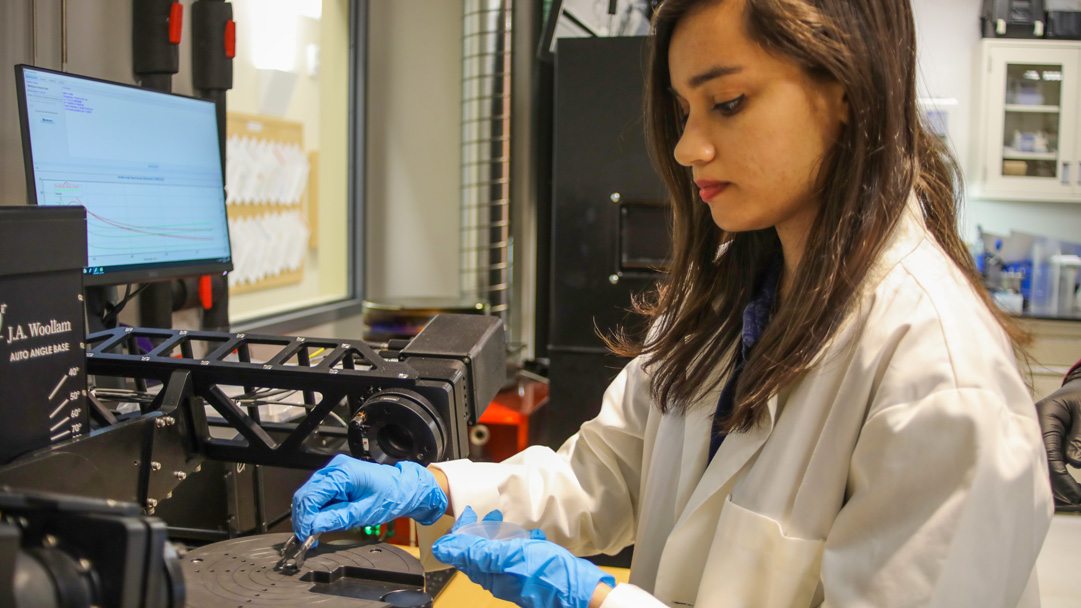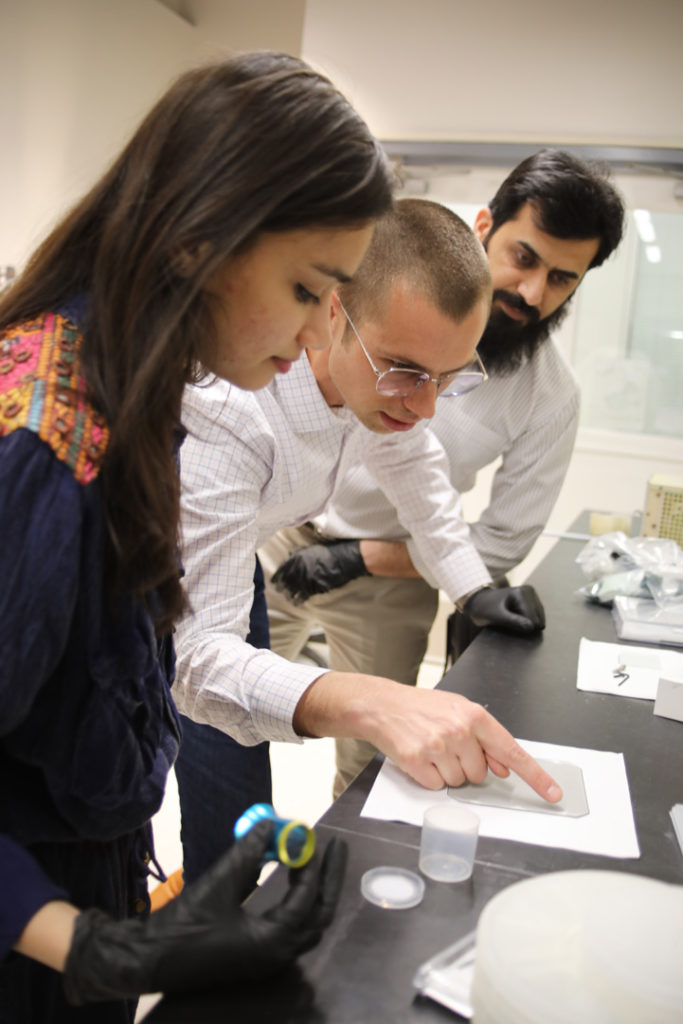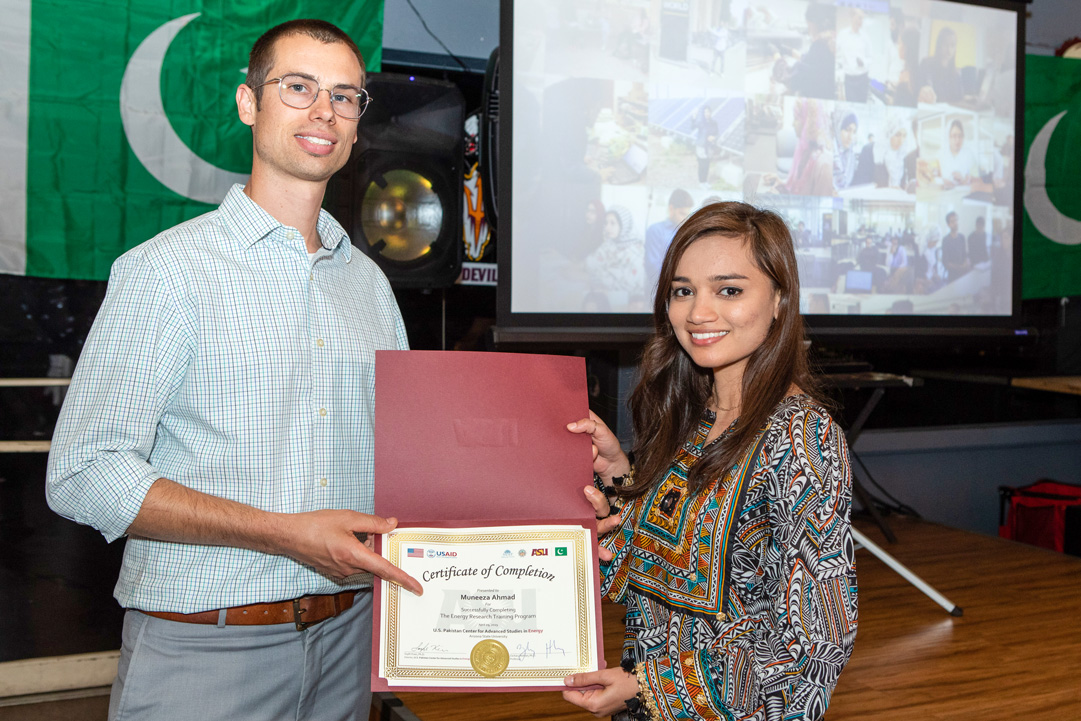Finding her place in the sun—and harnessing it for energy

For USPCAS-E scholar Muneeza Ahmad, a scholarship provided a life-changing opportunity
[et_pb_section bb_built=”1″ admin_label=”section”][et_pb_row admin_label=”row” background_position=”top_left” background_repeat=”repeat” background_size=”initial”][et_pb_column type=”4_4″][et_pb_text admin_label=”Text” background_position=”top_left” background_repeat=”repeat” background_size=”initial”]
Muneeza Ahmad is from Lahore, Pakistan and is currently enrolled in the Energy Systems Engineering program at the U.S.-Pakistan Center for Advanced Studies (USPCAS-E) at the National University of Sciences and Technology (NUST).
Even as a young girl, Muneeza Ahmad always enjoyed science and mathematics so when it was time for college, engineering seemed like the best fit.
“I like to solve problems and look at things from new perspectives.”
But Muneeza faced skepticism from her classmates about her decision to pursue engineering. Around the world, people still have a hard time picturing women when they hear the word “engineer.”
“They used to say girls were not cut out for engineering and will not contribute to the field in the future. But I had the support of my teachers and was able to convince them with my performance in the classroom and lab,” Muneeza says
Scholarship provides life-changing opportunity
Muneeza was working at a manufacturing supply firm in Lahore when she heard about the Center for Advanced Study in Energy at NUST, but it was a long journey that involved saving enough money to pay the fees.
“I had been thinking about getting a master’s degree for some time but due to the financial burden of my siblings’ education, I couldn’t ask my parents to pay for me. I saved up for a year to cover the application fee, first-semester tuition fees and hostel rent for my master’s program. Fortunately, I was able to secure the USAID scholarship so I could focus on my education without having to worry about money.”
One of the goals of the USAID funded U.S.-Pakistan Centers for Advanced Studies in Energy is to provide scholarships for promising students like Muneeza and create the highly educated energy-sector workforce that Pakistan needs to address its energy shortages.
Making the most of the exchange experience
 Muneeza is part of the spring 2019 exchange cohort at Arizona State University (ASU). During the five-year life of the USPCAS-E project, over 200 Pakistani faculty and students visited the United States to be part of a research and cultural exchange program at either ASU or Oregon State University (OSU).
Muneeza is part of the spring 2019 exchange cohort at Arizona State University (ASU). During the five-year life of the USPCAS-E project, over 200 Pakistani faculty and students visited the United States to be part of a research and cultural exchange program at either ASU or Oregon State University (OSU).
Exchange scholars are assigned to faculty mentors and work on research projects in their lab for a semester in addition to entrepreneurship and policy classes, business and social etiquette, and cultural and industry visits. Exchange scholars have described their experience as transformational. It opens up horizons and doors, creating depth in cross-cultural competency, expanding professional networks and increasing technical knowledge and experience.
“The best part is getting to meet new people. ASU has a diverse student body and I have made friends from all over the world. They have helped me cope with the homesickness and made the experience unforgettable.”
“I value the guidance I have received from my mentors and fellow students at the Energy Materials lab. They are always ready to help me out whenever I struggled with something. They are very passionate about what they do, and I am trying to incorporate this mindset in my work ethic as well.”
The focus of the exchange visit is on energy-related research in one of the engineering labs but it’s not all work and no play. During their time in the U.S., the exchange scholars have the opportunity to experience ASU culture and history through a variety of activities and excursions. One of the popular outings has been the Arizona Renaissance Festival.
“I had the best time at the Arizona Renaissance Festival because we got to revisit history through an immersive experience. There were so many interesting people selling their wares, providing entertainment and holding demonstrations at the event. I was not expecting the festival to be that huge with so many things to see and do.”
So, what does she enjoy when she’s not hard at work in the lab?
“I love being outdoors and my favorite activity is hiking or cycling. When I want to relax and de-stress I like to curl up with a good book and travel to fictional faraway lands using my imagination.”
Harnessing the power of the sun for all
In a place like Arizona where the sun shines almost every day, solar energy makes a lot of sense—but what about areas that do not get as much sunlight? Muneeza’s research focuses on leveraging photovoltaics in diverse environments.
“We are designing a thermophotovoltaic cell that converts heat into electricity. It will have a carbon heat source that emits thermal radiation which will be converted into electricity which means the device can run even when there is no sun. In theory, this will make it possible for areas that do not get a lot of sunlight to enjoy the benefits of photovoltaic technology. I am trying to find the best material for the anti-reflective coating so none of the incoming energy is wasted and all of it gets transmitted into the cell. I am using modeling software to design the structure and then verifying the results with the FTIR (Fourier-transform infrared spectroscopy) and spectrophotometer tools in the lab.”
After graduating Muneeza plans to work in a research lab to gain more experience in the field of materials so that she can contribute to cutting-edge research. And after that?
“In five years, I will be near to completing my Ph.D. degree, inshaa’Allah [God willing],” Muneeza says.

[/et_pb_text][/et_pb_column][/et_pb_row][/et_pb_section]